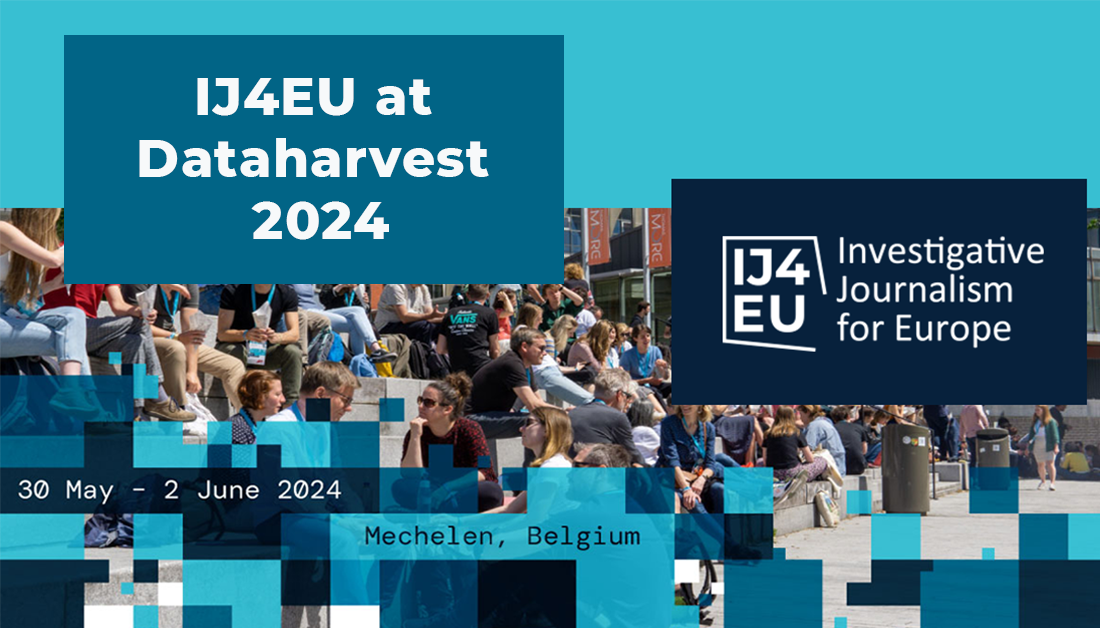Join IJ4EU at Dataharvest – The European Investigative Journalism Conference in Mechelen, Belgium.
IJ4EU is proud to take part in this year’s Dataharvest – The European Investigative Journalism Conference in Mechelen, Belgium, from May 30 to 2 June, 2024.
The IJ4EU fund is providing financial support to allow 27 grantees from the latest round of both the Investigation Support Scheme and Freelancer Support Scheme to attend the conference.
The financial assistance for each grantee includes the cost of a Dataharvest ticket and up to €600 to cover travel and accommodation.
Three representatives from the International Press Institute (IPI), which leads the IJ4EU consortium, will attend Dataharvest: Timothy Large, director of independent media programmes; Milica Miletić, projects and events coordinator; and Javier Luque, head of digital communications.
Representatives of other consortium partners will also attend: Zlatina Siderova, programme lead of European Journalism Centre, and Deniz Bozkurt, IJ4EU programme and event manager from the European Centre for Press and Media Freedom (ECPMF).
Arena for Journalism in Europe, which runs Dataharvest, is also a partner in the IJ4EU consortium.
Workshops
IPI’s Timothy Large will lead the following session on Saturday, June 1, 2024 at 1:45pm CEST:
Pitch Perfect: Mistakes to avoid when applying for a grant
For many investigative journalists, raising funds for projects is a necessary evil. But what makes the difference between a successful grant application and rejection? In this session, we will share common mistakes journalists make when applying for grants, both from the perspective of grant-givers and former grantees. We will discuss what works and what doesn’t and give top tips for what not to do.
The session will feature two former IJ4EU grantees with a wealth of experience in applying for funding for investigative projects: Alexandre Brutelle, co-founder and director of the Environmental Investigative Forum, and Hazel Sheffield, a coordinator for Arena for Journalism in Europe.
Meanwhile, IPI’s Javier Luque will lead two sessions:
Tackling online hate and smear campaigns: Self-dox yourself
Saturday, June 1 • 9:30am – 10:45am
Online hate campaigns are often used to try to silence journalists. What can you do to prevent them – and how can you combat them? In this session you will learn how to put your journalistic skills to work to combat the scourge of online harassment, and build a step-by-step guide to react to online hate. We will identify vulnerabilities in your digital footprint that are often weaponised by trolls; assess the potential impact of attacks on reporters; and discuss the best approach to combat attacks, even with limited resources. You will learn to conduct a self-doxing exercise: put yourself in the attackers’ shoes, and learn the techniques and tools they use to gather personal information about their target. You will also learn how to analyse the type of online violence directed at you, giving you the power to decide on the best course of action.
How the bad guys think: Decoding the Disinformation Playbook
Saturday, June 1 • 11:15am – 12:30pm
For the past 18 months, the International Press Institute has been working with investigative journalists at Taz in Germany and fact-checkers at Faktograf in Croatia to decode populist propaganda in Europe targeting fact-checkers and investigative journalists, both essential players in the fight against disinformation. In this session, we turn their investigations on their head to show you how it’s done from the bad actors’ point of view. Buckle up for a disturbing ride across the disinformation bubble in Spain and Hungary.
Journalism Fair
The IJ4EU consortium will also have a stand at Dataharvest’s Journalism Fair on Saturday, June 1. Drop by and speak to representatives from IPI, EJC and ECPMF.
